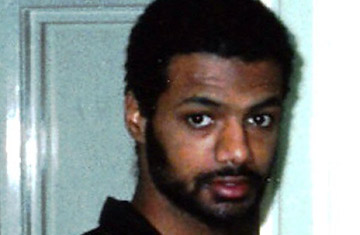
Binyam Mohamed
On Monday afternoon, a military flight touched down at an airbase on the outskirts of London. A frail man disembarked for an undisclosed location. This was the quiet homecoming of Binyam Mohamed, an Ethiopian refugee and British resident, who has finally been released after more than four years in Guantánamo Bay. "I have been through an experience that I never thought to encounter in my darkest nightmares," said Mohamed in a statement, read out by his British lawyer Clive Stafford Smith at a hastily arranged press conference. (See pictures from inside Guantánamo.)
Mohamed wasn't there; he is still far too fragile to face press and public. Indeed, he has always been the absence at the heart of his own story, a complex swirl of accusations and counter-claims. Arrested in Pakistan in 2002, Mohamed was allegedly subject to rendition to Morocco and Afghanistan, before ending up in Guantánamo. U.S. officials said he had trained at terror camps and planned a dirty bomb campaign. Last May the Pentagon formally charged Mohamed with conspiring to commit terrorism and war crimes. The charges were dropped five months later, but not before Mohamed's defense team used the British courts to try to secure classified U.S. intelligence material held by the British government, which the lawyers claimed would prove that evidence against their client had been obtained under torture. His legal team allege that Mohamed's captors in Morocco beat him, deprived him of sleep and slashed his genitals with a scalpel; in Kabul, his lawyers say that Mohamed was subjected to beatings and noise torture. "It is still difficult for me to believe that I was abducted, hauled from one country to the next, and tortured in medieval ways — all orchestrated by the United States government," said Mohamed in his statement.
In the same statement, Mohamed thanked "members of the British Foreign Office" who worked for his release, but the British government has not escaped the case with its reputation untarnished. Evidence submitted to the British courts to support the case for the release of the classified material alleges complicity by British intelligence in Mohamed's torture. Britain's Home Secretary, Jacqui Smith, has ordered an investigation to be conducted by Britain's attorney general. Human rights organization Amnesty International is pushing for an independent inquiry.
Kate Allen, Amnesty's U.K. director, believes both the U.S. and British governments would benefit from such a process. President Obama has "made a tremendous start" by announcing the closure of Guantánamo, she says, but "his tendency will be to look forward. He actually needs to look back to what happened before he took office. Whatever the ins and outs of the case, the British government looks like it's covering up."
That impression was given traction by the revelation that a U.S. official had written a letter to the British courts at the request of the Foreign Office warning of the risks for future intelligence sharing between Britain and the U.S. if London released U.S. classified material. Some press reports interpreted this as evidence of collusion to withhold the requested material. But a senior Foreign Office official says the British government had urged counterparts in America to provide the information requested by Mohamed's legal team. "We were saying to the Americans we think you should disclose this material to Mohamed's lawyers through your own legal process," says the official. "And, by the way, various American [officials] say disclosure of your intelligence against your will would have consequences for intelligence sharing. Why don't you write something down for the court on both points because it would be useful for the court to have a definitive account of your position."
Arguments about how and why Mohamed ended up in Guantánamo and what happened to him on the way there will rumble on. Stafford Smith doubts that the British authorities will bring any fresh charges against his client but sounded a defiant note at the press conference: "If anyone wants to put him on trial," he said, "in the immortal words of George Bush 'Bring it on.' " After years of captivity, it seems doubtful that Mohamed would meet any new challenge in that bombastic spirit.
